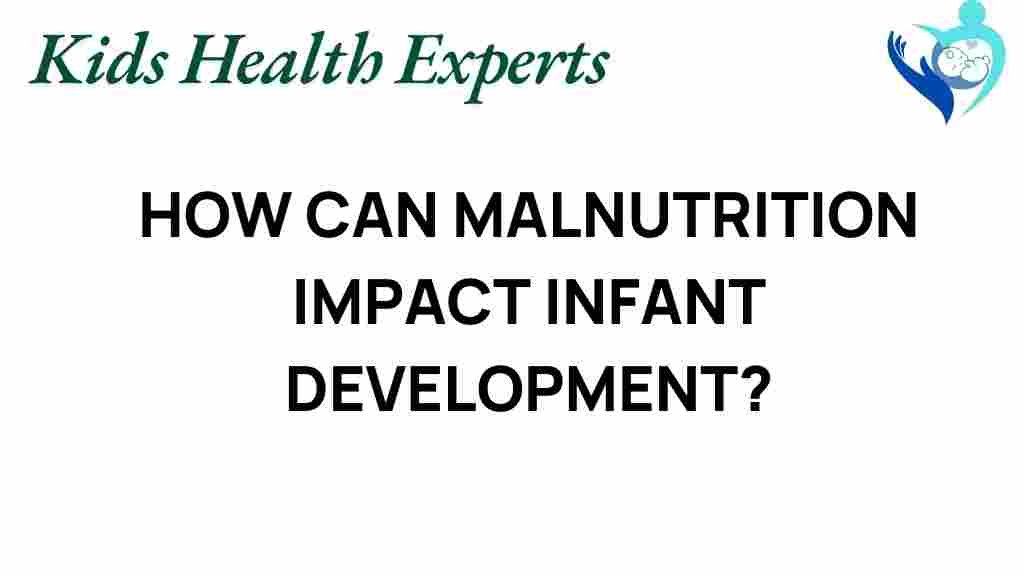The Hidden Dangers: How Malnutrition Shapes Infant Development
Malnutrition is a critical issue that affects infant growth and child health worldwide. Despite the abundance of food in many regions, nutritional deficiencies remain a significant concern, particularly in early childhood. Understanding how malnutrition impacts development milestones is essential for parents, caregivers, and health professionals alike. In this article, we will explore the various facets of malnutrition, its effects on infant growth, and the importance of proper feeding practices and maternal nutrition.
Understanding Malnutrition and Its Effects on Infant Growth
Malnutrition can be defined as a condition that arises from an inadequate or unbalanced intake of nutrients. It includes both undernutrition (deficiency) and overnutrition (excess), but this article will primarily focus on the effects of nutritional deficiencies on infant growth and development.
The Importance of Nutritional Deficiency Awareness
Nutritional deficiencies can lead to several health risks for infants, including:
- Stunted growth
- Delayed cognitive development
- Weakened immune system
- Increased susceptibility to diseases
These risks highlight the need for adequate nutrition during the crucial early childhood years, as this period is vital for establishing a strong foundation for lifelong health.
Development Milestones: The Impact of Malnutrition
Infants go through various development milestones in their first years of life, including physical, cognitive, and social-emotional development. Malnutrition can significantly hinder progress in these areas, leading to long-term consequences.
Physical Development Milestones
Physical growth is one of the most visible indicators of a child’s health. Malnutrition can result in:
- Stunting: A condition where a child is shorter than expected for their age due to chronic malnutrition.
- Wasting: A situation where a child has low weight for their height, indicating acute malnutrition.
Cognitive Development Milestones
Malnutrition not only affects physical growth but also cognitive development. Infants who do not receive adequate nutrition may experience:
- Delayed language skills
- Impaired memory and learning abilities
- Behavioral issues
Social-Emotional Development Milestones
Malnutrition can also have adverse effects on a child’s social-emotional development, leading to:
- Difficulty in forming secure attachments
- Increased anxiety and depression levels
- Challenges in social interactions
Health Risks Associated with Malnutrition in Early Childhood
The consequences of malnutrition during infancy extend beyond immediate health concerns. Long-term health risks include:
- Chronic diseases such as obesity, diabetes, and heart disease in later life
- Higher likelihood of mental health issues
- Overall reduced quality of life
These health risks underscore the importance of addressing malnutrition as early as possible, particularly in vulnerable populations.
Feeding Practices: A Key to Preventing Malnutrition
Proper feeding practices are crucial in ensuring that infants receive the necessary nutrients for optimal growth and development. Here are some essential tips for promoting healthy feeding practices:
1. Breastfeeding
Breastfeeding is recommended exclusively for the first six months of life, as it provides all the essential nutrients and antibodies that infants need. Benefits of breastfeeding include:
- Improved immunity
- Enhanced cognitive development
- Lower risk of chronic diseases later in life
2. Introducing Solid Foods
After six months, it is essential to introduce a variety of solid foods to ensure that infants receive a balanced diet. This includes:
- Iron-rich foods (e.g., pureed meats, beans)
- Fruits and vegetables
- Whole grains
3. Monitoring Growth
Regular check-ups with a pediatrician can help monitor an infant’s growth and nutritional status. Parents should be aware of their child’s growth charts and developmental milestones.
4. Education on Maternal Nutrition
The nutritional status of mothers plays a significant role in infant health. Maternal nutrition should be prioritized during pregnancy and breastfeeding to ensure that infants receive the best start in life. Key aspects include:
- Consuming a balanced diet rich in vitamins and minerals
- Staying hydrated
- Taking prenatal vitamins as recommended by healthcare providers
Troubleshooting Tips for Common Feeding Challenges
Many parents encounter challenges when feeding their infants. Here are some troubleshooting tips:
1. Picky Eaters
If an infant shows reluctance to eat certain foods, consider:
- Offering a variety of textures and flavors
- Involving the child in food preparation
- Being patient and persistent
2. Allergies and Intolerances
Some infants may develop allergies or intolerances to specific foods. It’s essential to:
- Consult a pediatrician for guidance
- Keep a food diary to track reactions
- Continue offering diverse foods once allergies are managed
3. Insufficient Breastfeeding
If breastfeeding is challenging, mothers can try to:
- Seek support from lactation consultants
- Practice skin-to-skin contact to encourage breastfeeding
- Consider expressing milk if direct feeding is difficult
Conclusion: The Path to Healthy Infant Development
Malnutrition poses hidden dangers that can significantly impact infant growth and child health. By understanding the effects of nutritional deficiencies on development milestones and implementing healthy feeding practices, families can help ensure that children thrive during their early years. Furthermore, prioritizing maternal nutrition is vital for providing infants with the essential nutrients they need for optimal health.
For more information on infant nutrition and feeding practices, visit this resource. Additionally, for help with nutrition-related challenges, consider reaching out to local health services or pediatricians.
Remember, every child’s journey is unique; being informed and proactive about nutrition can make a world of difference in shaping a healthier future.
This article is in the category Nutrition and created by KidsHealthExperts Team
